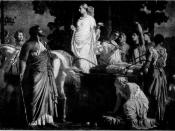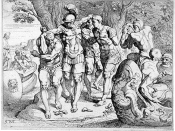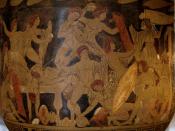In the story The Odyssey by Homer, the constant interference of suitors delays Odysseus' return to his home land Ithaka. These suitors represent Odysseus' desires which prevent him from obtaining his prime directive. Desires interfere with the pursuit of identity. There are three types of desires that are shown. Firstly, desire for physical objects which is shown by Odysseus' shipmates; secondly, lustful desire which is shown by Penelope and Odysseus' suitors, and thirdly, the desire for knowledge which is shown by Odysseus. These desires impede Odysseus' quest for his identity.
The first type of desire shown by Odysseus' shipmates is the desire for physical objects. One of the first instances where the shipmates show their desire for objects is during the encounter with Polyphemas. The shipmates entered into the Kyklopês cave, and, upon seeing his plentiful produce, begged Odysseus to "take these cheeses, get them stowed, come back, throw open all the pens, and make a run for it."
(Book IX, lines 235-236) This desire for personal possessions reflects Odysseus' own desires for wealth and fame through any means necessary. By taking Polyphemas' cheeses, Odysseus and his crew are trapped in their own greed and wanton thieving. Another occurrence of the shipmates' desire for physical possessions is referred to in book I. It states that "they killed and feasted on the cattle of lord Hêlios." (Book I, line 12-13) Their lack of respect towards the property of the Gods shows that their pilfering is not biased and that their actions do not stem from a particular need rather from greed. This incident caused further delay of Odysseus' arrival at Ithaka. It is evident throughout his journey that Odysseus and his crew have no respect for other people's possessions or sentiments, a common attitude in Greek ethics. After plundering Troy, they...


